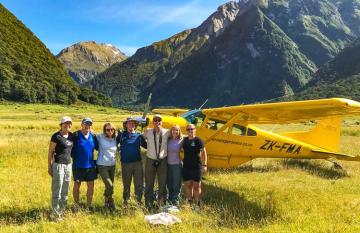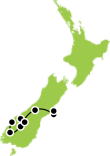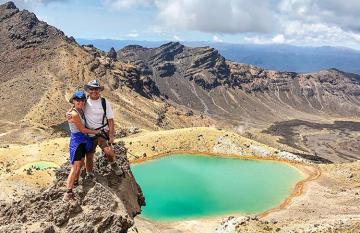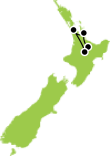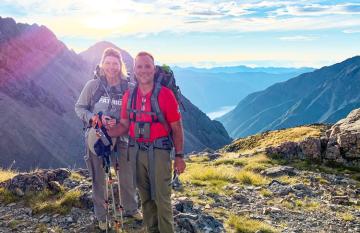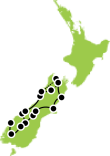
New Zealand has been described by National Geographic as a 'world in miniature'. New Zealand is a land of incredible natural wonders with a unique ecosystem featuring many species found only on these islands - and we want to keep it that way! Sustainable tourism is everything to us, this is our country and we love living here, our job is to help others experience that very thing we treasure the most. So we have put strategies in place to promote the positive impacts and to minimise the negative.
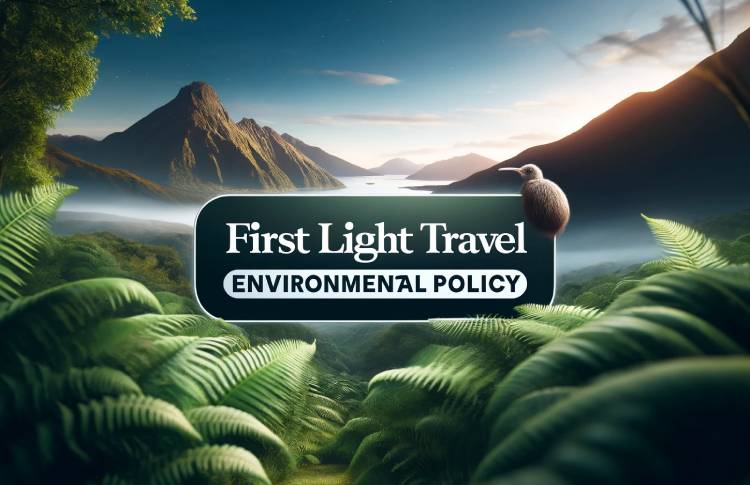
Like other parts of the “New World”, New Zealand’s natural environment has seen fundamental changes with the arrival of modern European cultures with many introduced species which have often harmed the endemic species – and human activity which has degraded much of the original native forest and habitat. There are however many positives. New Zealand has long taken an environmentally enlightened stance in international affairs and its tourism industry is 10, possibly 15 years ahead of many countries who might otherwise consider themselves to be leading in responsible eco-tourism.
First Light Travel has a well-developed Leave-No-Trace ethic in New Zealand. We are involved in supporting a range of local conservation efforts. Most of all, however, we believe that joining one of our journeys will inspire you to be a passionate advocate for New Zealand’s unique wild places should they be under threat in the future. We are passionate about wilderness and wild places and it is a real privilege to share the landscapes, flora, and fauna with our clients. We greatly value these assets and are absolutely committed to operating in a manner which conserves and enhances our natural environment.
Our business activities and trip operations are purposefully designed to minimise environmental impact of carbon emissions. We will encourage our partners, suppliers, and sub-contractors to improve their contribution to sustainable development and management of tourism, and will work with them and share information to assist in this. We seek to support locally-owned New Zealand guiding operations who can demonstrate to us a similar passion for the natural environment. All of our partners are involved where practical in local conservation efforts and we believe that in journeying to New Zealand you are contributing to a valuable alternative natural economy in sustainable tourism.
Our Policies
All of our trips in New Zealand are committed to the implementation of the following environmental policies:
• Itinerary designs which have utmost regard to minimising the impact on the local environment and improving it wherever possible.
• Location choice – we have deliberately sought to design our journeys in the regions where you are most likely to be inspired to become an ambassador for New Zealand’s wild places in the future.
• Our Group Tours – We maintain genuinely small group sizes which minimise the environmental and social footprint of our trips.
• A destination-based approach which reflects the carrying capacity of tourist locations with an emphasis on undiscovered and off the beaten track locations.
• A focus on experiences which require human power e.g. trekking, mountain biking in preference to vehicle-based itineraries.
• A policy of “leave no trace” which is relevant to wild camping, flora and fauna, waste disposal, visual and noise intrusion, and other land users.
• Client briefings on environmental awareness, responsibilities, and practice with particular emphasis on highlighting local environmental issues/threats. An opportunity to offset carbon emissions arising from international air travel.
and more importantly...
First Light Travel acknowledges our contribution to climate change, and we are responsible for committing to a journey of change to reduce our environmental footprint. Our carbon measurement and offset program covers flights, accommodation, and vehicle travel.
How?
We found it fitting to extend our support to one of New Zealand's most impactful volunteer environmental organizations, 'Arrowtown Choppers.' This dedicated group focuses on removing wilding pines above Arrowtown, hence the name 'Choppers,' and replaces them with native Beech, Ribbonwood, and Totara trees to enrich the area's biodiversity.
We are deeply committed to this cause through volunteering, financial contributions, and various forms of support. Each native tree can be planted for less than $5, and we are dedicated to reducing this cost further, ensuring an even greater impact for our conservation efforts.
Join us on the journey of reducing our environmental footprint.
First Light Travel and our sister company New Zealand Trails acknowledge that we need to reduce our environmental footprint. Our carbon measurement and offset program to date has allowed us to plant over 3000 native beach trees.
Beech trees (Nothofagus species) can sequester a significant amount of carbon over their lifetimes. A mature tree can store about 22 kg of CO2 per year on average.
You can opt-in and help for as little as $NZ5pp (US$3) - or not, it's ok, we are going to do it anyway. This year we donated $NZ10.000 (that's 3,333 trees) and volunteered a lot of labor - and we intend to do better next and every other year.
Please feel free to contact us if you have a question.
Interested to find out more about First Light Travels Sustainability focus?
We are proud to be the major sponsor of the Arrowtown Community Tree Nursery
Congratulations Danielle! First Light Travel Appoints Sustainability Manager Danielle
Its time to improve our environmental footprint Find Out How to Offset Your Carbon
Check out our article explaining the concept of the QEII Covenant Land Donation: Mahu Whenua Land Donation
Read about our Tree Planting Event in April 2024: First Light Travel Tree Planting April 2024
Learn more about our Tree Planting Event in October 2023: First Light Travel Tree Planting October 2023
Discover more about the 2024 Global Sustainability Conference: 2024 Global Sustainability Conference
Recent Posts
Blog Categories
Blog archives
- February 2025 (3)
- January 2025 (6)
- December 2024 (12)
- November 2024 (3)
- October 2024 (2)
- July 2024 (2)
- May 2024 (12)
- April 2024 (2)
- March 2024 (2)
- January 2024 (2)
- November 2023 (10)
- October 2023 (4)
- August 2023 (1)
- May 2023 (2)
- April 2023 (2)
- March 2023 (17)
- February 2023 (4)
- January 2023 (4)
- December 2022 (11)
- November 2022 (7)
- October 2022 (1)
- May 2022 (1)
- March 2022 (3)
- February 2022 (3)
- January 2022 (1)
- December 2021 (1)
- August 2021 (1)
- June 2021 (1)
- May 2021 (2)
- February 2021 (1)
- August 2020 (1)
- July 2020 (1)
- May 2020 (1)
- April 2020 (1)
- March 2020 (1)
- January 2020 (1)
- December 2019 (1)
- November 2019 (1)
- October 2019 (1)
- September 2019 (1)
- August 2019 (5)
- July 2019 (2)
- June 2019 (1)
- May 2019 (3)
- April 2019 (1)
- March 2019 (1)
- February 2019 (1)
- January 2019 (1)
- December 2018 (1)
- November 2018 (1)
- September 2018 (1)
- August 2018 (1)
- July 2018 (1)
- June 2018 (1)
- May 2018 (1)
- April 2018 (1)
- March 2018 (1)
- February 2018 (1)
- January 2018 (1)
- December 2017 (1)
- October 2017 (1)
- September 2017 (1)
- August 2017 (1)
- July 2017 (1)
- June 2017 (1)
- May 2017 (1)
- April 2017 (1)
- March 2017 (1)
- February 2017 (1)
- January 2017 (1)
- December 2016 (1)
- November 2016 (1)
- October 2016 (1)
- September 2016 (1)
- August 2016 (1)
- July 2016 (1)
- June 2016 (1)
- May 2016 (1)
- April 2016 (1)
- March 2016 (1)
- February 2016 (1)
- January 2016 (1)
- December 2015 (1)
- November 2015 (1)
- October 2015 (1)
- September 2015 (1)
- August 2015 (1)
- July 2015 (1)
- June 2015 (1)
- May 2015 (1)
- April 2015 (1)
- March 2015 (1)
- February 2015 (1)
- January 2015 (1)
- December 2014 (1)
- November 2014 (1)
- October 2014 (1)
- September 2014 (1)
- July 2014 (1)
- June 2014 (3)
- May 2014 (1)
- April 2014 (1)
- March 2014 (1)
- February 2014 (1)
- January 2014 (1)
- November 2013 (15)
- October 2013 (1)
- September 2013 (1)
- August 2013 (1)
- July 2013 (1)
- May 2013 (1)
- April 2013 (1)
- March 2013 (1)
- February 2013 (1)
- January 2013 (1)
- December 2012 (1)
- November 2012 (2)
- October 2012 (2)
- September 2012 (2)
- August 2012 (2)
- July 2012 (2)
- June 2012 (2)
- May 2012 (2)
- April 2012 (3)
- March 2012 (2)
- February 2012 (2)
- January 2012 (3)
- December 2011 (1)
- November 2011 (1)
- October 2011 (2)
- September 2011 (1)
- August 2011 (1)
- July 2011 (1)
- June 2011 (1)
- May 2011 (1)
- April 2011 (1)
- March 2011 (1)
- February 2011 (1)
- January 2011 (1)
- December 2010 (1)
- November 2010 (1)
- October 2010 (1)
- September 2010 (1)
- August 2010 (1)
- July 2010 (1)
- June 2010 (1)
- May 2010 (1)
- March 2010 (1)
- February 2010 (1)
- January 2010 (1)
- December 2009 (1)
- November 2009 (1)
- October 2009 (1)
- September 2009 (1)
- August 2009 (1)
- July 2009 (1)
- June 2009 (1)
- May 2009 (1)
- April 2009 (1)
- March 2009 (1)
- February 2009 (1)
- January 2009 (1)
- December 2008 (1)
- May 2005 (1)




